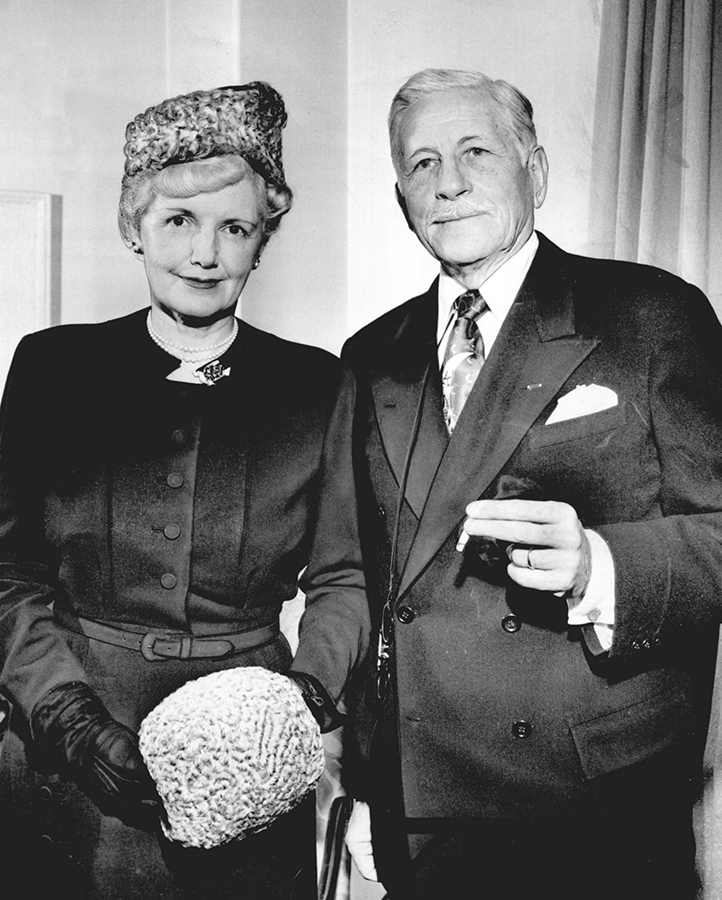
The Encyclopedia of Oklahoma History and Culture
HURLEY, PATRICK JAY (1883–1963).
Lawyer, military officer, and diplomat Patrick Jay Hurley, fourth of eight children of Pierce O'Neil and Mary Kelly Hurley, was born in the Choctaw Nation, near present Coalgate, Oklahoma, on January 8, 1883. At age eleven Patrick worked beside his father in the nearby coal mines. His mother's death in 1896 and other family illnesses and deaths broke up the family. In 1898 fifteen-year-old Patrick went to Texas, hoping to join the Rough Riders. Too young to enlist, he returned to Indian Territory to find employment. He came in contact with a Cherokee cowboy named Will Rogers (the noted humorist), who broke him in as a ranch hand.
Although both of his parents were of Irish descent, Hurley attended Bacone Indian College (currently Bacone College) in Muskogee. He worked for his room and board, finding time for football, baseball, debating, and editing the school paper. After graduation in 1905 he worked in the Indian Land Office in Muskogee. Hurley then attended the National University Law School in Washington, D.C. Graduating in 1908, he returned to Tulsa, Oklahoma, and began an oil and gas law practice. He invested in Tulsa real estate, which became the basis of his personal wealth.
Hurley entered politics in Tulsa. Affiliated with the Republican Party, he was their candidate for state representative in 1910. In 1911 he was elected president of the Tulsa Bar Association, and Pres. William Howard Taft appointed him national attorney for the Choctaw Nation. In 1916 Hurley won a lawsuit that kept the Mississippi Choctaws from enrolling with the Oklahoma Choctaws, thus protecting the Oklahoma Choctaws' oil and gas revenues from dilution.
While a student at Bacone in 1903, Hurley had enlisted in the Indian Territory Militia. After he resigned as national attorney for the Choctaws, he was a captain in the Oklahoma National Guard. Called to active duty in 1916, he participated in the punitive expedition against Pancho Villa in Mexico. In 1917 Hurley was assigned to the Judge Advocate General's Office in Washington, D.C. He went to France with an artillery unit and was transferred to logistics, supply, the inspector general's staff, and combat. Promoted to lieutenant colonel, he received a citation for gallantry. After the armistice Gen. John J. Pershing appointed Hurley as U.S. representative to the Grand Duchy of Luxembourg, negotiating the right of transit for the American Army of Occupation from France to Germany. On his return to Oklahoma in 1919, Hurley stopped in Washington, D.C., to marry Ruth Wilson, the daughter of Adm. Henry B. Wilson, Commander of the U.S. Atlantic Fleet. Having a military background, Hurley participated in the restoration of order during the Tulsa Race Massacre in 1921.
Settling down in Oklahoma, Hurley delved into business and politics. As president of the First Trust and Savings Bank of Tulsa, he was a receiver of Gilliland Oil Company. He persuaded the creditors to be patient while he developed the company's properties prior to their sale and as a result was able to pay the lenders in full. In 1935 he played a key role in developing the Interstate Oil Compact, standardizing laws and regulations between oil producing states. The Sinclair Oil Company retained him in 1939 to negotiate with Mexico for payment of the company's nationalized assets. Being successful, he earned a million-dollar fee.
Hurley's political and military careers worked in tandem. After chairing the 1926 Republican State Party Convention, Hurley coordinated Herbert Hoover's presidential campaign in Oklahoma. Hoover tapped him for assistant secretary of war, and in 1929 he was appointed secretary of war, thus becoming the first Oklahoman to serve as a cabinet member. Secretary of War Hurley championed the appointment of Douglas MacArthur as army chief of staff.
When the Japanese attacked Pearl Harbor, Hurley was promoted to brigadier general and sent to Australia to manage the resupply of besieged forces in the Philippines. After the Philippine garrison surrendered, he accepted appointment in April 1942 as the first U.S. minister to New Zealand. Pres. Franklin D. Roosevelt made Hurley his "personal representative," sending him to Europe, the Middle East, and Asia. In the Soviet Union he was the only allied military officer allowed to survey the Stalingrad battlefront. In November 1944 Roosevelt appointed him U.S. ambassador to China. At the end of World War II Pres. Harry S. Truman accepted Hurley's resignation.
Hurley retired to New Mexico, and as a resident of that state he made three unsuccessful bids between 1946 and 1952 for the U.S. Senate. He passed away on July 30, 1963, at age eighty. His wife, Ruth, three daughters, Patricia, Ruth and Mary, and one son, artist Wilson Hurley, mourned his passing.
See Also
BRYCE NATHANIEL HARLOW, JEANE JORDAN KIRKPATRICK, TWENTIETH-CENTURY OKLAHOMA, WORLD WAR I, WORLD WAR II






